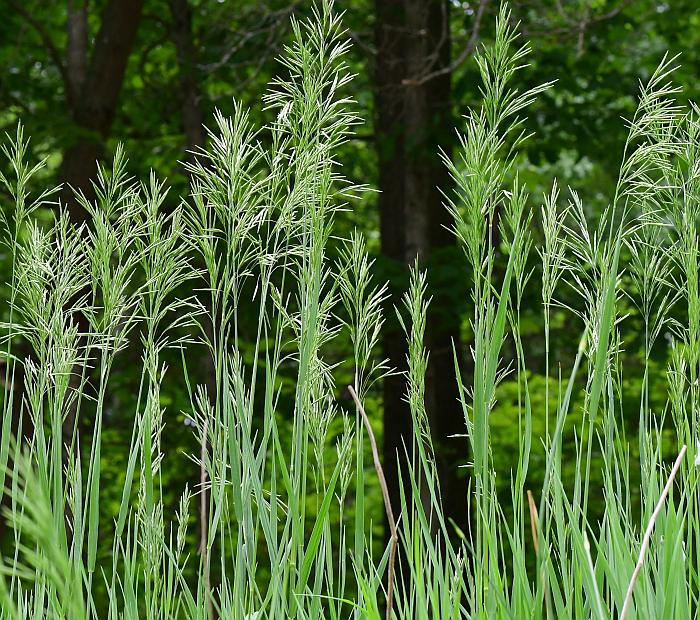Bromus inermis Leyss.
Smooth Brome

Introduced
CC = *
CW = 5
MOC = 55
© SRTurner
Bromus inermis Leyss.Smooth Brome | |
 |
Introduced CC = * CW = 5 MOC = 55 |
© SRTurner |
|
Family - Poaceae/Bromeae Habit - Perennial cool-season (C3) grass, with rhizomes well developed and creeping, forming loose colonies.
Stem - Flowering stems 45-130 cm long, erect or ascending, glabrous or nearly so.
Leaves - Leaves 4-6 per stem. Leaf sheaths loosely overlapping, glabrous, closed, the tip strongly concave (V-shaped), without auricles. Leaf blades 9-35 cm long, 8-15 mm wide, glabrous, dull on the undersurface.
Inflorescences - Dense to more commonly open panicles with numerous spikelets, the branches strongly ascending at maturity, sometimes somewhat spreading during development, the stalks of the spikelets shorter than to longer than the spikelets.
Spikelets - Spikelets 15-40 mm long, circular to slightly compressed laterally in cross-section at maturity, with 4-10 florets. Lower glume 4-8 mm long, narrowly elliptic, 1-nerved, glabrous but usually roughened along the midnerve. Upper glume 7-11 mm long, narrowly elliptic, 3-nerved, glabrous but usually roughened along the midnerve. Lemmas 9-12 mm long, elliptic, rounded on the back, the margins not inrolled at maturity, 3-or 5-nerved, glabrous but usually roughened along the nerves and margins, the apical teeth 0.2-0.5 mm long, awnless or the awn 0.5-2.5 mm long, straight or nearly so. Paleas somewhat shorter than the lemmas. Anthers 3.5-6.0 mm long. Fruits 8-9 mm long, circular in cross-section to somewhat flattened or slightly V-shaped, the longitudinal groove narrow and shallow.
Flowering - May - July. Habitat - Roadsides, pastures, open, disturbed areas. Widely cultivated as forage and for hay. Origin - Native to Europe. Lookalikes - Other species of Bromus. Other info. - This introduced brome is widespread in Missouri, and also throughout most of the U.S. excepting several southern and southeastern states. Like all bromes, it has a closed leaf sheath. The spikelets are long and cylindrical, and have no awns (or at most very short ones). The lower glume is single-nerved and the upper 3-nerved, and the lemmas are glabrous. Photographs taken near Labadie, Franklin County, MO, 5-12-2023 (SRTurner). |